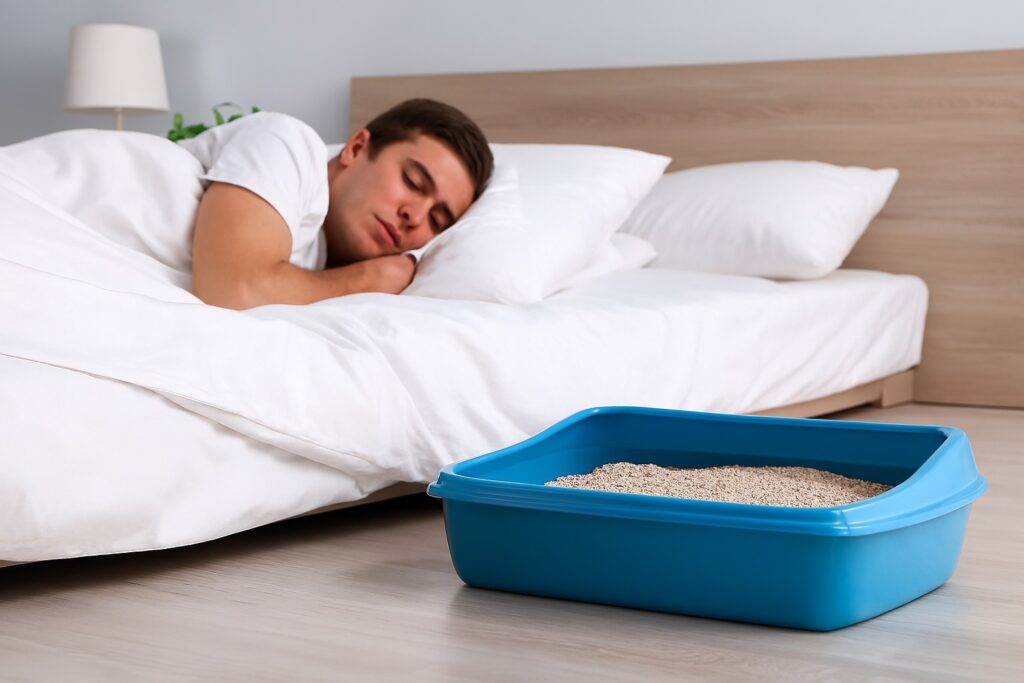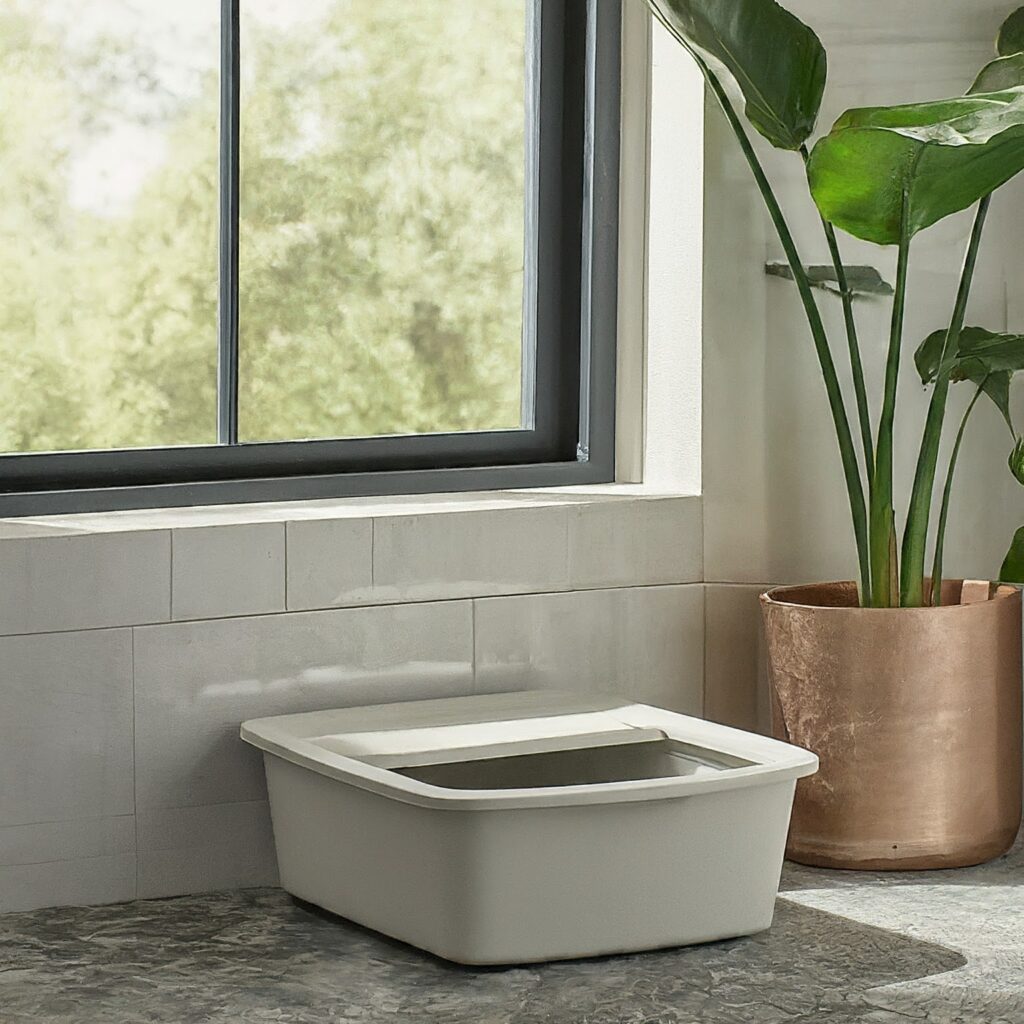
If you live in a small apartment, studio, or shared space, you might find yourself asking: “Is it safe to sleep with a litter box in the bedroom?” It’s a common concern for cat parents who don’t have the luxury of extra rooms. Beyond convenience, there are real questions about health, odor, and overall hygiene when your cat’s bathroom shares the same space where you rest.
In this guide, we’ll explore the potential health risks, discuss why odor and hygiene matter, and share smart solutions to make co-living with a litter box more comfortable. Whether you’re worried about dust, smell, or where to put the box in a small room, we’ll cover the risks and the best practices so you — and your cat — can both sleep peacefully.
Table of Contents
Is it safe to sleep with a litter box in the bedroom?
Yes — it can be safe to sleep with a litter box in the bedroom if the box is kept clean, the room is well-ventilated, and low-dust, odor-control litter is used. For most healthy adults, the risks are minimal, but issues like ammonia odor, litter dust, or parasites can become concerns if hygiene is neglected. Pregnant women, young children, and people with weakened immune systems should avoid having a litter box in their sleeping space and keep it elsewhere whenever possible.
Health & Safety Concerns of Sleeping Near a Litter Box
1. Common Health Risks
Sleeping in the same room as your cat’s litter box isn’t automatically dangerous, but it does come with some potential risks. One of the most common concerns is ammonia exposure. Cat urine releases ammonia, and in a poorly ventilated bedroom, this can cause throat irritation, watery eyes, or even headaches over time.
Another issue is toxoplasmosis and other parasites. While the risk is generally low for healthy adults who clean regularly, litter can carry microscopic organisms that may cause illness if hygiene is ignored.
Finally, litter dust can be a trigger for people with allergies or asthma. Clay-based litters, in particular, release fine particles into the air that you could breathe in while sleeping. This is why many pet owners search for “health risks sleeping with cat litter in the room” or “cat litter dust respiratory issues” when deciding where to place the box.
2. Who Should Be Extra Careful?
Certain groups should take additional precautions:
- Pregnant women: Exposure to Toxoplasma parasites can pose risks to pregnancy.
- Children: They’re more vulnerable to germs and dust in close quarters.
- Immunocompromised individuals: Anyone with a weakened immune system should avoid prolonged exposure to litter box waste.
Read this guide to understand how to manage cat litter during pregnancy
If you fall into one of these categories, it’s best to keep the litter box out of the bedroom entirely or consult a veterinarian or healthcare provider for safer alternatives.
Odor & Hygiene Issues in Bedrooms and Small Apartments
1. Why Litter Box Smell Is Worse in Small Rooms
One of the biggest downsides of having a litter box in your bedroom is the smell. In small rooms with poor ventilation, odors build up quickly. Even if you scoop daily, the concentrated ammonia smell from cat urine can linger — especially at night when windows are closed. That’s why many cat owners search phrases like “cat litter box smell in bedroom” or “reduce cat litter odor at night” to find ways to manage it.
2. Hygiene Habits That Help
The good news is, with the right cleaning routine and products, you can keep odors under control:
- Daily scooping prevents strong smells from building up.
- Weekly deep cleaning (washing the box with mild soap and water) helps eliminate hidden bacteria.
- Odor-control litters like clumping clay, activated carbon, or silica crystals trap smells more effectively than basic litter.
- Safe deodorizing hacks — sprinkling a small amount of baking soda at the bottom of the box, or using pet-safe litter deodorizers, can make a big difference.
By following these steps, you’ll know how to keep your bedroom from smelling like a litter box while still living comfortably with your cat.
Best Litter Box Placement in Small Spaces
1. Choosing the Right Spot
When space is limited, deciding where to put a litter box in a bedroom can be tricky. The key is to find a spot that works for both you and your cat. Ideally, avoid placing it right next to your bed — you don’t want odors or noise disturbing your sleep.
Better options include:
- Corners of the room where there’s some airflow.
- Closets with ventilation (never sealed closets).
- Attached bathrooms, which often make the best place for a litter box in small apartment settings.
The goal is to balance accessibility for your cat with comfort for you.
2. What to Avoid
Some spots might seem convenient, but create bigger problems:
- Near food and water bowls – cats dislike eating close to their litter area, and it’s unhygienic. Read this: where to put the cat food and water bowls
- Next to direct airflow from fans, heaters, or AC – this can spread odors around the room.
- Completely enclosed, unventilated spaces – these trap odors and ammonia, making it unpleasant for both you and your cat.
A good placement strategy keeps the litter box accessible, discreet, and well-ventilated — the perfect balance in small living spaces.
Tips to Minimize Litter Dust and Smell
1. Switch to Low-Dust or Alternative Litters
If you’re struggling with airborne particles, switching litter types can make a big difference. Traditional clay litters tend to create the most dust, which can trigger allergies and settle on furniture. Instead, try silica gel crystals, recycled paper pellets, or wood-based litter. These options are much cleaner and safer for the air in your bedroom. Many cat owners specifically look for low-dust cat litter for the bedroom to make sharing a space more comfortable.
2. Improve Air Quality
Good ventilation is essential if you’re sharing a room with a litter box. Simple steps like cracking a window or using a fan can reduce odor buildup. For even better results, invest in the best air purifier designed to trap dander, dust, and smells. This not only keeps the air fresh but also protects your respiratory health. It’s no wonder people often ask if they should use an air purifier for a litter box — and the answer is yes, it helps a lot.
3. Extra Odor Control Hacks
Along with litter choice and airflow, small upgrades can make your setup more hygienic:
- Litter box liners make cleaning easier and reduce trapped odors.
- Covering litter boxes with carbon filters helps contain smells.
- Frequent litter changes — even with scooping, replacing all the litter every 1–2 weeks is key.
These small steps add up to a noticeable improvement in both air quality and comfort, so you and your cat can coexist happily in the same room.
Shared-Space Solutions & Alternatives
1. Self-Cleaning and High-Tech Options
If you’re short on time or simply want less daily maintenance, a self-cleaning cat litter box small space setup can be a game-changer. These automatic boxes scoop waste on their own, which helps keep odors down and reduces the frequency of litter handling. The main benefits are convenience and cleanliness, but they do have drawbacks — higher cost, more noise, and sometimes they can startle sensitive cats.
2. Furniture-Style or Enclosed Boxes
Another smart option for apartments and bedrooms is to hide the litter box in furniture-style enclosures. These double as decor while helping to contain odor and mess. For example, you can find nightstands, benches, or cabinets designed to hold a litter box discreetly. A simple litter box cover for small room setups can also work well.
That said, there are some enclosed litter box benefits and risks to consider. While they help with smell and dust control, some cats dislike confined spaces, and poor ventilation can trap odors if not cleaned often.
3. Outdoor or Balcony Options (When Available)
If you’re lucky enough to have outdoor access, you might explore an outdoor litter box for apartment living. Weatherproof litter stations or balcony enclosures can keep smells out of your living space entirely. Just be sure the area is safe, sheltered, and easy for your cat to access.
Conclusion
So, is it safe to sleep in the same room as cat litter? The answer is: yes, with the right precautions. As long as you maintain good hygiene, keep the box clean, and ensure proper ventilation, sharing a room with your cat’s litter box doesn’t have to be a health hazard. Choosing low-dust litter, managing odors, and picking the best placement in a small space all go a long way toward making it manageable.
Every cat household is different, so experiment to see what works best for your setup and comfort level. If you notice persistent allergies, strong odors, or health concerns, don’t hesitate to speak with a veterinarian or healthcare professional for tailored advice.
With a bit of planning and care, both you and your cat can enjoy a clean, safe, and restful space — even if the litter box lives in the bedroom.
FAQs About Sleeping in the Same Room as a Litter Box
1. Is it safe to sleep with a litter box in the bedroom?
Yes, it can be safe for most healthy adults if the litter box is kept clean, odor is controlled, and the room is ventilated. However, pregnant women, children, and people with weakened immune systems should avoid it due to potential health risks.
2. What are the health risks of sleeping near a litter box?
The main risks include ammonia exposure from cat urine, litter dust that can trigger allergies or asthma, and rare exposure to parasites like toxoplasmosis. Regular cleaning greatly reduces these risks.
3. How can I reduce the cat litter box smell in my bedroom?
Scoop daily, deep clean weekly, and use odor-control litter (such as clumping clay, silica crystals, or activated carbon). Baking soda or pet-safe deodorizers can also help reduce smells.
4. Where is the best place to put a litter box in a small apartment?
The best spots are corners of rooms, ventilated closets, or attached bathrooms. Avoid placing it right next to your bed, near food, or in completely enclosed spaces without airflow.
5. What type of cat litter is best for a bedroom?
Low-dust and odor-control litters work best in bedrooms. Silica gel, recycled paper, or wood pellet litter are cleaner and release fewer particles into the air compared to traditional clay.
6. Should I use an air purifier if the litter box is in my bedroom?
Yes, an air purifier can help trap dust, dander, and odor molecules, making the air cleaner and healthier to breathe — especially in small spaces.
7. Are self-cleaning litter boxes good for bedrooms?
Self-cleaning litter boxes reduce odor and cleaning time, making them ideal for small spaces. However, they can be noisy and more expensive than traditional boxes.
8. Can I keep a litter box on my balcony or outdoors instead?
Yes, if your apartment allows and the area is safe, weatherproof outdoor litter stations or balcony setups can keep odors out of your living space.


